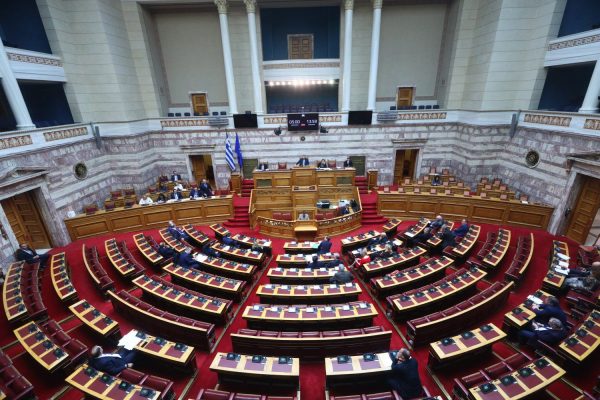
“The will of the government, either with the Agency for the Acquisition and Re-leasing of Real Estate, or with other means, which have already been put in place or are about to be put in place, is to protect the truly vulnerable. This is our unchangeable position. But the “big fish” are not vulnerable, nor are those who pretend to be poor, when they are not. And it would be a challenge to the truly poor to defend, in the name of certain doctrines, people who are not poor, at a time when thousands of debtors despite the difficulties are fulfilling their obligations”.
This was pointed out by the Minister of National Economy and Finance, Kostis Hatzidakis, responding today in the Parliament to a question from the president of “Pleusis Eleftheria”, Zoi Konstantopoulou, about the protection of borrowers.
Mr. Hatzidakis mentioned that in the framework of the current legislation for the coverage of vulnerable borrowers, there was an initiative that had as a condition the cross-referencing of the bank accounts of the applicants and out of the 40,000 potential beneficiaries, only 4-5,000 allowed this cross-reference. “I don’t doubt your intentions, but these are elements that we all have to take into account,” stressed the Minister of National Economy and Finance, addressing Ms. Konstantopoulou, and added: “We apply modern European practices and we will introduce new regulations in the near future that increase servicers’ obligations. The framework must be constantly evolving. I look forward to proposals that take the whole picture into account and do not ignore existing tools to protect borrowers.”
Protection tools
Presenting the existing protection tools and the additional possibilities that exist or will be instituted immediately, the Minister of National Economy and Finance pointed out:
The tens of thousands of bilateral agreements reached between borrowers and debt management companies.
The new framework of rules and obligations with which the servicers, who manage the red loans, will be required to provide personalized information to the debtors about their total debt, the installments due, the interest rate and other relevant information that they currently do not provide. Penalties will also be provided when there is no clear and timely notification to debtors.
Debt arrangements for debts to the State, such as old and new debt arrangements in 120 and 72 installments which will be open until next Monday, July 31.
The out-of-court mechanism for overall settlement of debts both to the State and to the banks, which at the same time ensures significant protection for those who join it. As the minister said, continuous improvements are being made to the mechanism to make it even more efficient and fair, while he noted that in June there was a record high of applications, as well as a new monthly record of arrangements.
The Intermediate First Home Support Program for Vulnerable Households of the Ministry of National Economy and Finance, which provides, among other things, a state subsidy of the housing loan installment up to 210 euros per month for 15 months and suspension of measures (seizures, auctions, evictions) against debtors.
The Interest Subsidy Program for loan installments of vulnerable borrowers implemented by banks as part of corporate responsibility initiatives.
In addition to these, the State covers the vulnerable with additional tools such as – among others – the OPECA housing allowance which allocates resources of 400 million euros to over 280,000 beneficiaries and the innovative “Housing and Work” program for the homeless.
Holistic approach
Mr. Hatzidakis also stated that the government will proceed with a holistic approach to the issue, taking into account the following parameters:
That there is a need to support the truly vulnerable borrowers. “We don’t give away the right to social sensitivity to anyone,” he said.
That the vulnerable should be truly vulnerable and not people who hide their wealth and income for various reasons. “This will ensure that the arrangements will be accepted not only by them but also by all the others who, despite the difficulties, continue to pay their loans and installments to the Tax Office and EFKA property tax. We have to take into account the whole of society.”
That the country, like all countries, must be okay with the commitments it has undertaken towards its creditors and in relation to the support of the banking system. “Just recently,” he said, “we’ve experienced the adverse consequences of putting the burden on taxpayers to recapitalize banks.”
That with all the handling, the foundations must be laid for the restructuring of the economy, since it is about business loans, but also for the creation of a new, more positive framework that will allow the banks to take more courageous steps in the direction of granting new mortgage loans.
That a framework of solutions must be followed in which good practices from other countries, mainly in Europe, for the management of private debt are transferred to Greece. “There is no need,” he said, “to reinvent the wheel.”
Latest News

Greece Prepares for State Budget Vote as Debate Reaches Final Stages
Prime Minister Kyriakos Mitsotakis is expected to deliver his remarks late in the evening, shortly before the decisive vote that will conclude the session

DM Dendias: We talk With Turkey But We Always Bring Up Their Unacceptable Positions
Second and last day of closely watched conference, entitled 'Metapolitefsi 1974-2024: 50 Years of Greek Foreign Policy', also included appearances by PM Mitsotakis, Ex-PM Tsipras and PASOK leader Nikos Androulakis, among others

Rhodes Airport Tops Fraport Greece’s Regional Airports in 2024 Performance
According to Fraport's data, more than 35 million passengers (specifically 35.2 million) were handled by Fraport-managed airports during the 11 months.

European Central Bank Cuts Interest Rates by 25 Basis Points
It is the fourth cut of interest rates by Europe’s central bank, a move expected by the markets and financial analysts leading to the rate settling at 3%.

Airbnb: New Measures Add €600 in Extra Costs for Property Owners
Property managers face an immediate administrative fine of 5,000 euros if access to the inspected property is denied or any of the specified requirements are not met.

Economist: Greece Included in the Best Performing Economies in 2024
Meanwhile, Northern European countries disappoint, with sluggish performances from the United Kingdom and Germany.

EasyJet Expands Its Routes from Athens
The airline’s two new routes will be to London Luton and Alicante and they will commence in summer 2025.

Capital Link Forum Highlights Greece’s Economic Resurgence; Honors BoG Gov Stournaras
Capital Link Hellenic Leadership Award recipient, Bank of Greece Gov. Yannis Stournaras, an ex-FinMin, was lauded for his pivotal role during Greece’s economic recovery

Tourist Spending in Greece Up by 14%, Visa Card Analysis Shows
Greece’s capital Athens emerged as the most popular destination, recording a 17% increase in transactions with Visa cards, surpassing even the cosmopolitan island of Mykonos.

Inflation in Greece Unchanged at 2.4% in Nov. 2024
The general consumer price index (CPI) posted a 0.4% decrease in November compared to the previous month



![Φυσικό αέριο: Δυναμικό come back του LNG στην Ελλάδα [γραφήματα]](https://www.ot.gr/wp-content/uploads/2023/01/OT_naturalgas-90x90.jpeg)











![Fraport: Πάνω από 35 εκατ. επιβάτες στα αεροδρόμια το 11μηνο – Πτώση στη Μύκονο [πίνακας]](https://www.ot.gr/wp-content/uploads/2022/06/fraport-90x90.jpg)










![Χριστουγεννιάτικο τραπέζι: Ακριβότερο φέτος κατά 10% σε σχέση με το 2023 [πίνακας]](https://www.ot.gr/wp-content/uploads/2022/12/xristoygenniatikotra-600x399.jpg)















 Αριθμός Πιστοποίησης Μ.Η.Τ.232433
Αριθμός Πιστοποίησης Μ.Η.Τ.232433